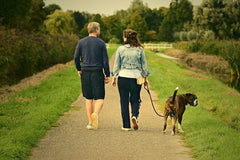
As your dog ages, many aspects of their lives also change. For example, older dogs tend to be more sedentary. They also have different nutritional needs due to their metabolism transitioning from the vibrant young pup that they once were to the aged, wise senior that they now are.
Most dogs become seniors between six and twelve years of age. Since smaller dogs have longer lives, on average, they become seniors later. Conversely, larger dogs can be seniors within six or so years.
Once pets become seniors, many of their dietary needs change. Here are the three changes that you'll need to know to give your pet the happiest life possible.
Dogs May Develop Specific Conditions That Require Different Foods
As Fido ages, he'll develop health problems just like humans do. Sometimes these complications will require different foods or supplements. For example, dogs frequently develop arthritis. As such, vets often recommend adding a glucosamine-chondroitin supplement as well. Similarly, if your dog develops kidney or liver issues, they may need food that is low in protein.
Usually, as dogs get older, unless there is a specific medical condition that requires different food, you don't need to feed them anything different than you did when they were younger. If they like that food, you can keep that for them even as they advance in years.
Fruits And Vegetables Are Helpful
Much like humans, dogs benefit from eating small amounts of fruits and veggies. You can add things like wheat bran, steamed green beans, or canned pumpkin to their diet. The goal is to add more fiber as aging dogs can be prone to constipation.
Conversely, like humans, as your dog becomes older, feeding him or her food that is bad for their health becomes more problematic. While it might be fun giving Fido some table food, it has more potential health risks, the longer your dog lives. Therefore, it's generally advisable not to give older pets table food or, if you must, to do so in small quantities and rarely.
They'll Need To Eat Less
As your dog becomes older, he or she will be significantly less active. What was once a vibrant game of fetch for an hour will now last for substantially less time. As such, the calories that your dog will be burning on any given day are smaller than what they were consuming when they were younger.
Therefore, you're going to want to cut back a bit on the portions as your dog ages. There's no hard science to this. Instead, you should discuss a healthy weight with your vet and adjust their food portions accordingly.
Small Changes Have A Big Impact
By feeding your pet a little less, giving them the occasional fruit or vegetable, and giving them specialty foods (if needed), you'll be giving your dog the best chance possible at a long, healthy life. None of these changes are significant by any means, but they will keep your dog happy, healthy, and joyful for as long as possible!
Check out our blog and follow me on LinkedIn to stay up-to-date!





Comments
I like your post a lot I just stumbled upon your blog and wanted to say that I’ve enjoyed browsing your posts. I will subscribe to your feed, and I look forward to reading your next post. I highly recommended